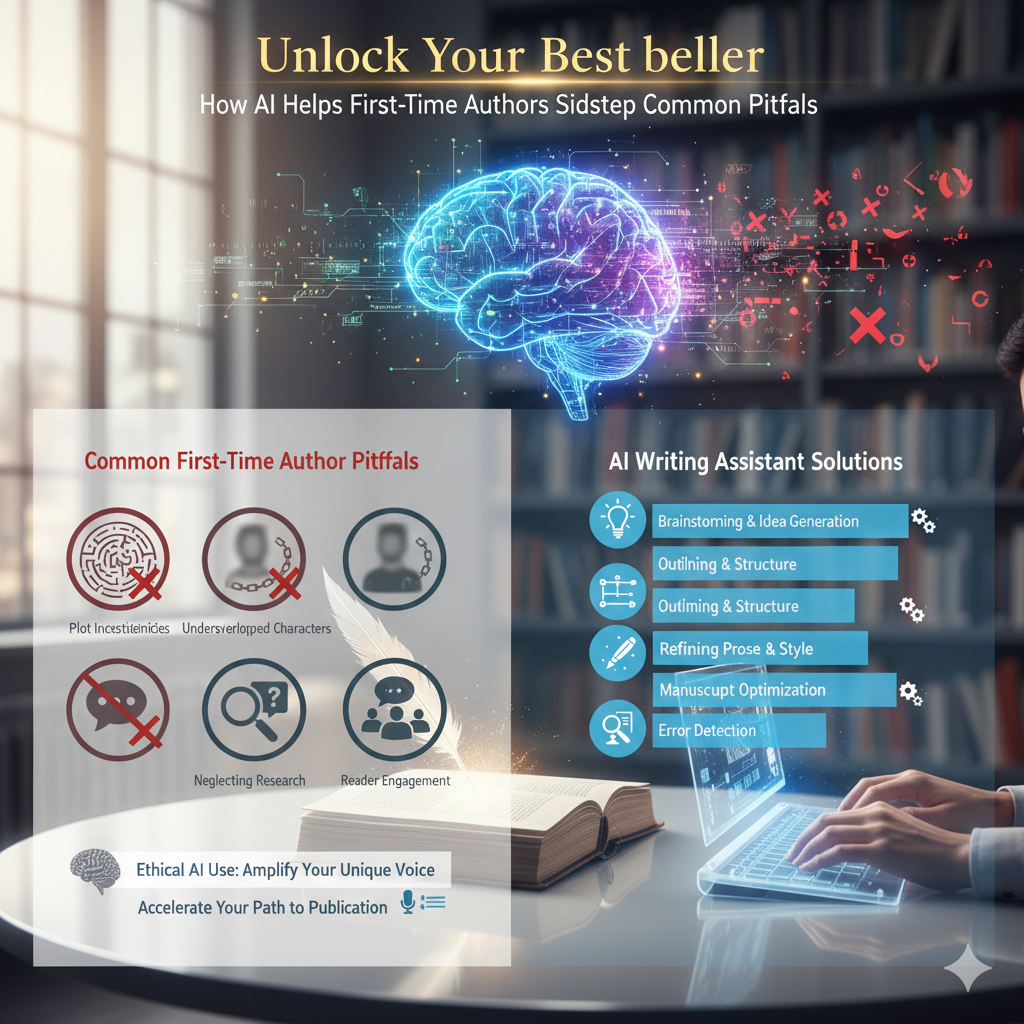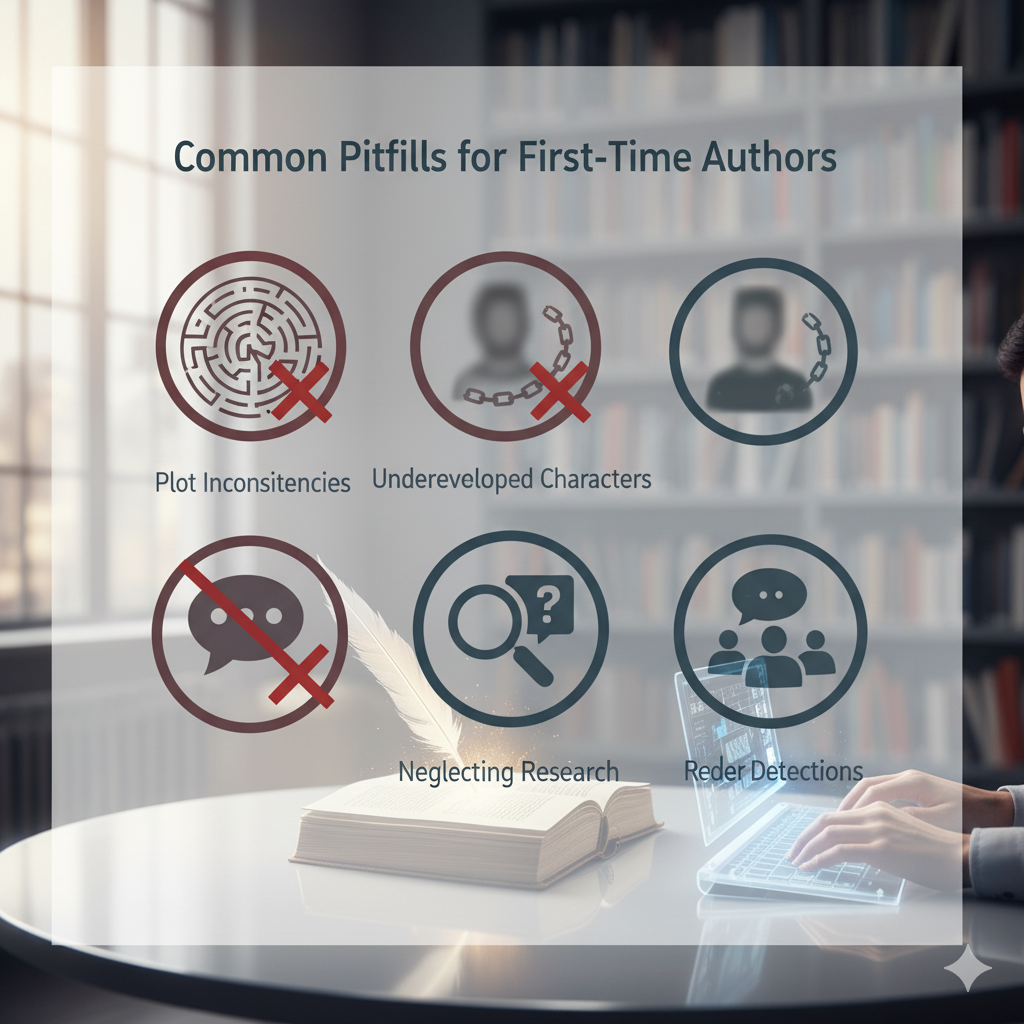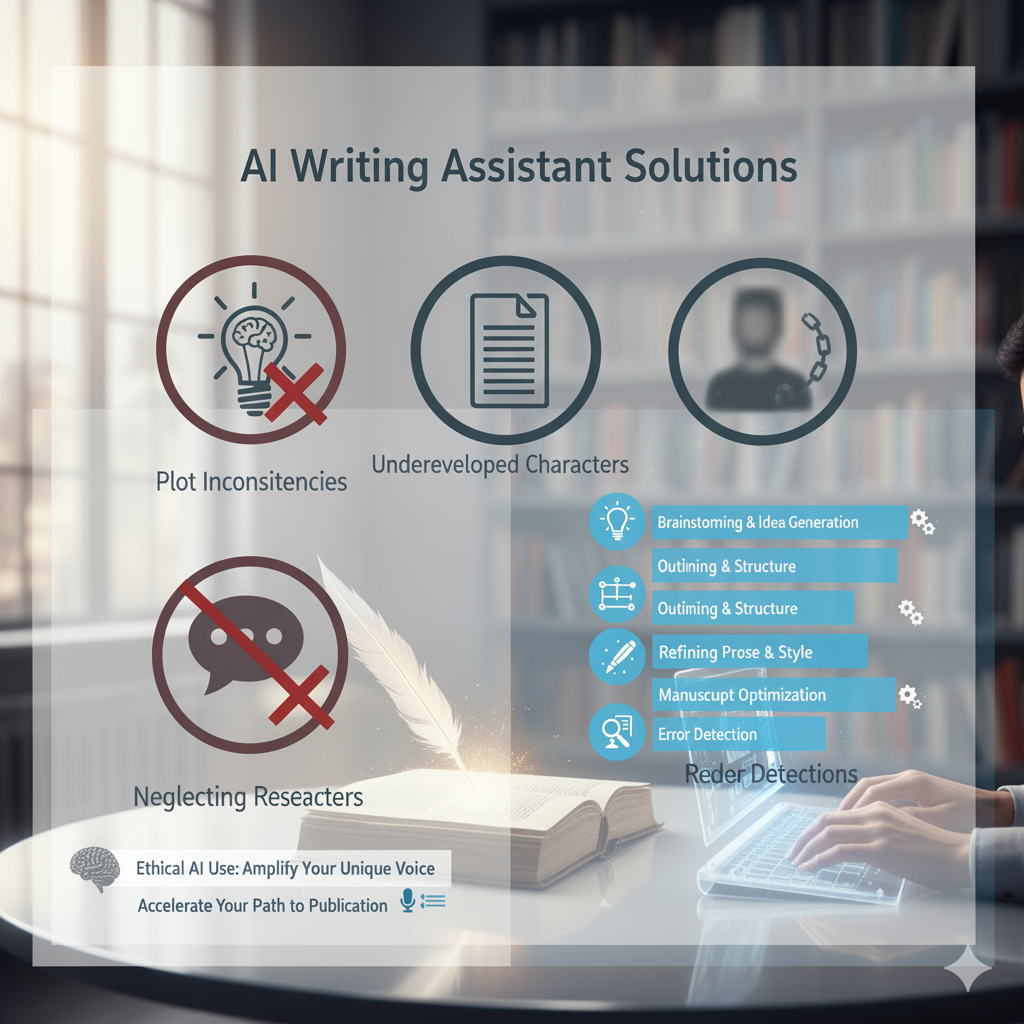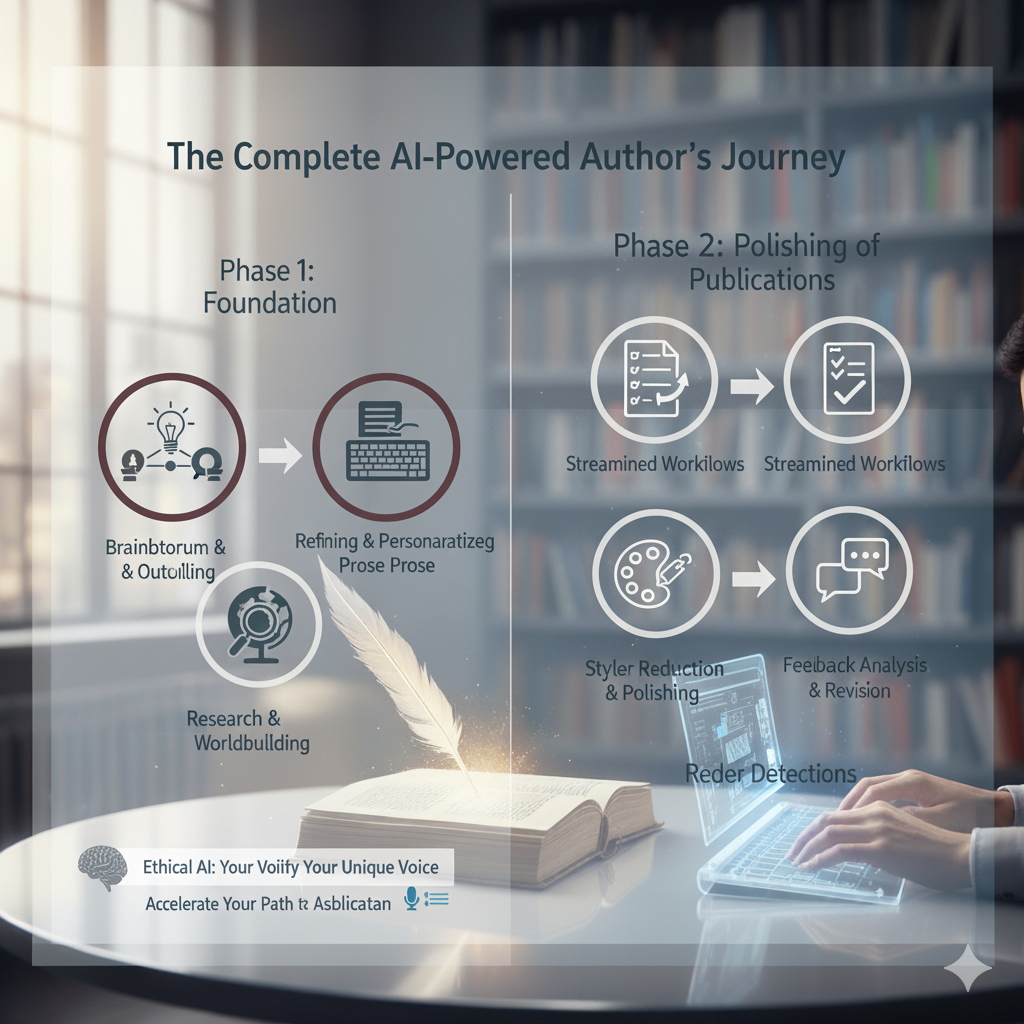
The dream of writing a book is a powerful one, a calling that stirs the soul and promises the profound satisfaction of bringing a unique story or invaluable knowledge into the world.
Yet, for many first-time authors, this journey can feel like navigating a dense, uncharted forest.
The path to publication is often fraught with unexpected challenges, steep learning curves, and common pitfalls that can derail even the most passionate and talented new writers.
It’s a journey I understand well, having witnessed countless aspiring authors grapple with the complexities of storytelling, structure, and reader engagement.
In today’s rapidly evolving literary landscape, a new ally has emerged to help aspiring authors overcome these hurdles: Artificial Intelligence (AI) writing assistants.
These intelligent tools are no longer just futuristic concepts; they are practical, accessible resources that can significantly streamline the writing process.
However, like any powerful tool, AI must be wielded with wisdom and ethical consideration.
This comprehensive guide will delve into the most prevalent mistakes first-time authors make and, crucially, demonstrate how AI can ethically assist in overcoming them, ensuring your unique voice not only survives but thrives on the page.

Common Mistakes First-Time Authors Make (and How AI Can Be Your Guide)
Embarking on your first book project is an act of courage, but it’s also an endeavor where inexperience can lead to common missteps.
Let’s explore these frequent errors and how an AI writing assistant, used thoughtfully, can illuminate a clearer path forward.
1. The Foggy Vision: Lack of a Clear Elevator Pitch or Overcrowded Narrative
One of the most fundamental mistakes new authors make is failing to distill their entire story into a concise, compelling
summary, often referred to as anelevator pitch [1].
- Without this clear vision, narratives can become unfocused,
- leading to and overcrowded narrative with too many points of view,
- excessive subplots,
- or a cast of characters that overwhelms the reader [2].
It’s like trying to build a house without a blueprint; you might have all the materials, but the final structure lacks cohesion and purpose.
How AI Helps: An AI writing assistant can be invaluable here.
It can help you brainstorm core concepts, refine your central theme, and even generate multiple variations of an elevator pitch.
By inputting your initial ideas, AI can help you identify the strongest narrative threads and suggest ways to simplify complex plots, ensuring your story has a clear, engaging direction from the outset.
This process helps you solidify your book’s foundation before you invest countless hours in writing, saving you from potential rewrites down the line.
2. The Shallow Dive: Neglecting Research and World-Building
Whether you’re crafting an epic fantasy, a historical drama, or a non-fiction exposé, neglecting thorough research is a critical misstep.
For fiction, this can manifest as inaccuracies in historical settings, inconsistent world-building rules, or characters whose actions don’t align with their environment.
In non-fiction, insufficient research leads to a lack of depth, credibility, and authority [1]. The reader quickly senses when a writer hasn’t done their homework, leading to a loss of trust and engagement.
How AI Helps: AI tools excel at rapid information gathering and fact-checking. They can quickly pull relevant data, historical facts, scientific principles, or cultural nuances to enrich your narrative.
Beyond simple data retrieval, AI can assist in generating detailed character profiles, crafting intricate world-building elements, and even suggesting plot points that align with established lore.
This allows you to focus on the creative aspects of writing, confident that your foundational details are robust and accurate.
Remember, however, that AI outputs must always be thoroughly fact-checked by a human, as these tools are known to occasionally “hallucinate” or present incorrect information [3].
3. The Narrator’s Trap: Telling, Not Showing
Show, don’t tell” is one of the oldest and most frequently cited pieces of writing advice, yet it remains one of the most challenging for first-time authors to master.
Instead of allowing readers to experience emotions, events, or character traits through vivid sensory details and actions, new writers often resort to simply stating them.
For example, writing “She was sad” instead of “Tears welled in her eyes, blurring the world as a heavy sigh escaped her lips” [1].
This approach keeps the reader at a distance, preventing deep emotional connection with the story.
How AI Helps: AI writing assistants can be trained to identify instances of “telling” in your prose.
They can suggest more descriptive language, offer alternative phrasing that emphasizes sensory details, and even expand on scenes to demonstrate emotions or actions rather than merely stating them.
By highlighting these areas, AI acts as a diligent editor, prompting you to transform abstract statements into immersive experiences for your readers.
It encourages you to paint pictures with words, drawing your audience deeper into your narrative world.

4. The Disorienting Dance: Inconsistent Point of View (Head-Hopping)
Another common error that can quickly disorient and frustrate readers is inconsistent point of view (POV), often referred to as “head-hopping.”
This occurs when the narrative perspective shifts abruptly between different characters within a single scene or chapter, giving the reader whiplash as they try to keep track of whose thoughts and feelings they are privy to [1].
A consistent POV, whether first-person, third-person limited, or omniscient, provides a stable anchor for the reader, allowing them to fully immerse themselves in a character’s experience.
How AI Helps: AI tools can be programmed to analyze your text for POV consistency.
They can flag instances where the narrative voice shifts unexpectedly or where you might be inadvertently revealing information that a particular POV character wouldn’t know.
By identifying these inconsistencies, AI helps you maintain a singular, focused perspective, ensuring a smoother and more engaging reading experience.
It can suggest rephrasing sentences to align with the chosen POV, helping you to stay firmly rooted in one character’s head at a time.
5. The Flatline Narrative: Lack of Tension or Weak Conflict
Every compelling story, whether fiction or non-fiction, thrives on tension and conflict.
Without a strong central conflict, a narrative can feel aimless, lacking the driving force that keeps readers turning pages.
First-time authors sometimes introduce too many minor conflicts that don’t coalesce into a larger, overarching struggle, or they resolve conflicts too easily, leading to an anticlimactic experience [1, 2].
The stakes feel low, and consequently, reader investment wanes.
How AI Helps: AI writing assistants can be powerful partners in developing robust plotlines and escalating tension.
They can help you brainstorm various conflict scenarios, explore the motivations and stakes for your characters, and identify opportunities to heighten dramatic impact.
By analyzing your plot structure, AI can suggest where to introduce new obstacles, deepen existing conflicts, or create moments of suspense that keep readers on the edge of their seats.
It encourages you to think critically about the challenges your characters face and how those challenges propel the story forward.
6. The Ornate Overload: Purple Prose and Overwriting
Many new writers, eager to demonstrate their linguistic prowess, fall into the trap of purple prose – using overly elaborate, ornate, or unnecessarily complex language.
This often results in writing that feels unnatural, distracting, and ultimately detracts from the story rather than enhancing it [1, 2].
The goal of good writing is clarity and impact, not to impress with a thesaurus. Overwriting can also manifest as excessive descriptions or redundant phrasing that bogs down the narrative pace.
How AI Helps: AI tools are excellent at identifying verbose passages and suggesting simpler, more direct phrasing.
They can help you streamline your sentences, eliminate redundancies, and improve overall clarity and conciseness.
By offering alternative word choices and sentence structures, AI encourages you to write with precision and elegance, ensuring your message is conveyed effectively without unnecessary embellishments.
It acts as a digital editor, helping you to prune your prose and let your story shine through.
7. The Echo Chamber: Forgetting the Reader (Writing for Everyone/No Target Audience)
One of the most crucial aspects of successful authorship, often overlooked by first-timers, is the importance of the reader.
Many new authors write primarily for themselves, failing to consider their target audience’s pain points, interests, or expectations.
This can lead to a disconnect, making it difficult to engage readers and effectively market the book [1, 2].
A book written for “everyone” often resonates with no one.
How AI Helps: AI writing assistants can help you define and understand your target audience more deeply.
They can assist in generating content tailored to specific reader demographics, refining your elevator pitch to highlight benefits for that audience, and even crafting marketing copy that speaks directly to their needs.
By analyzing successful works in your genre, AI can provide insights into reader expectations, helping you to shape your narrative and themes to better connect with your intended readership.
This strategic approach ensures your book finds its way into the hands of those who will most appreciate it.

8. The Rollercoaster Ride: Inconsistent Pacing
Pacing refers to the speed at which your story unfolds, and inconsistent pacing can be a significant deterrent for readers.
A narrative that rushes through important plot points or, conversely, lingers too long on minor details can lead to reader disengagement and frustration [2].
A well-paced story offers a dynamic reading experience, with moments of high tension and rapid action balanced by slower, more reflective passages.
How AI Helps: AI tools can analyze the flow of your narrative, identifying sections where the pace might be dragging or accelerating too quickly.
They can suggest where to expand on crucial moments, condense less important details, or introduce dialogue and action to pick up the speed.
Conversely, AI can highlight areas where more description or internal monologue might be needed to slow things down and build atmosphere.
This analytical capability helps you to create a more balanced and engaging rhythm for your story, keeping readers captivated from beginning to end.
9. The Rebel Without a Cause: Not Understanding Genre Conventions
Every literary genre comes with its own set of expectations, tropes, and conventions.
While innovation is celebrated, first-time authors sometimes make the mistake of defying these conventions without fully understanding them, which can alienate readers who approach a genre with specific expectations [2].
For instance, a mystery novel typically promises a resolution to a central puzzle, and a romance often concludes with a happily-ever-after. Subverting these without purpose can leave readers feeling unsatisfied.
How AI Helps: AI writing assistants can provide comprehensive summaries of genre conventions, helping you to understand the established patterns within your chosen field.
They can analyze existing works in your genre, highlighting common plot structures, character archetypes, and thematic elements.
This knowledge empowers you to either adhere to conventions effectively or to subvert them intentionally and creatively, ensuring your innovations are impactful rather than accidental.
AI helps you to speak the language of your genre, even as you seek to expand its vocabulary.
10. The Starving Artist: Ignoring the Business Side of Writing
Many first-time authors are so consumed by the creative act of writing that they neglect the crucial business aspects of authorship.
This oversight includes understanding publishing options (traditional vs. self-publishing), developing a marketing and promotion strategy, building an author platform, and navigating contracts [2].
Ignoring these elements can severely hinder a book’s success, even if the writing itself is brilliant. A masterpiece hidden in a drawer, or one that never finds its audience, is a missed opportunity.
How AI Helps: AI can be a powerful assistant in managing the business of being an author.
It can help generate compelling marketing copy for your book, draft engaging social media posts, brainstorm blog ideas to build your author platform, and even assist in creating email newsletters.
While AI cannot replace a literary agent or a publishing lawyer, it can provide valuable support in crafting the materials needed to attract attention and connect with readers,
allowing you to focus more on your craft while still building your author brand.

11. The Lone Wolf: Not Seeking Professional Editing
Perhaps one of the most critical mistakes a first-time author can make is believing they can self-edit their way to a polished manuscript.
While self-editing is an essential skill, a professional editor brings an objective eye, specialized expertise, and a fresh perspective that a writer simply cannot provide for their own work [2].
Editors catch errors in grammar, syntax, plot holes, character inconsistencies, and overall story structure that the author, too close to their own creation, will inevitably miss.
Investing in professional editing is not an expense; it is an investment in your book’s success and your reputation.
How AI Helps: AI writing assistants can perform initial grammar and spell checks, identify stylistic inconsistencies, and even highlight potential structural issues.
They can act as a first-pass editor, catching many surface-level errors and suggesting improvements in clarity and flow.
However, it is crucial to understand that AI is not a replacement for professional human editing [3].
AI can assist in refining your manuscript to a certain degree, making it more presentable for a human editor, but the nuanced understanding of story, character, and theme that a professional editor provides is irreplaceable.
Use AI to polish, but always budget for a human touch.
12. The Unfinished Symphony: Giving Up Too Soon
The journey to becoming a published author is often long, arduous, and filled with rejections, revisions, and moments of profound self-doubt.
One of the most heartbreaking mistakes first-time authors make is giving up too soon[2].
Discouragement from initial setbacks or the sheer amount of work involved can lead aspiring writers to abandon their dreams, leaving their stories untold and their voices unheard.
Persistence, resilience, and a belief in one’s own unique contribution are paramount.
How AI Helps: While AI cannot instill perseverance, it can certainly help mitigate some of the factors that lead to giving up.
By automating tedious tasks like brainstorming, outlining, and initial drafting, AI can reduce the overwhelming feeling of a blank page.
It can help break down large writing projects into manageable steps, providing a sense of progress and momentum.
AI can also assist in generating ideas for revisions, making the feedback process less daunting.
By making the writing process more efficient and less intimidating, AI can help authors stay motivated and committed to seeing their projects through to completion.
Ethical AI: A Partner, Not a Replacement
As we embrace the transformative potential of AI in writing, it is imperative to address its ethical use.
The Authors Guild, among other organizations, has provided clear guidelines for authors utilizing AI tools [3].
The core principle is simple: AI should be a tool to support, not replace, human creativity and voice.
Here are key ethical considerations for using AI in your writing process:
Maintain Your Voice: AI-generated text, even when trained on your work, is a regurgitation of existing data, not your original authorship.
Always rewrite AI-generated content in your own unique voice before incorporating it into your manuscript [3].
Your distinct perspective is what makes your work valuable.
Disclosure is Key: If you incorporate a significant amount of AI-generated text, characters, or plot into your manuscript, you must disclose this to your publisher and, ideally, to your readers.
Publishing contracts often require authors to warrant that the manuscript is original, and AI-generated material is not considered “original” to you and is not copyrightable [3].
Transparency builds trust with both your publisher and your audience.
Fact-Check Everything: AI models are prone to “hallucinations” – presenting false information as fact.
Always thoroughly review and fact-check any content generated by AI systems, especially for non-fiction works or factual elements in fiction [3]. Your credibility depends on it.
Respect Copyrights: Do not use generative AI to copy or mimic the unique styles, voices, or distinctive attributes of other writers’ works in ways that could harm their rights or lead to claims of unfair competition [3].
Originality and respect for intellectual property remain paramount.
Understand Platform Policies: Be aware of and mindful of publisher and platform-specific policies regarding AI use.
For example, Amazon KDP requires disclosure of “AI-generated content” when publishing new or updated books [3]. Staying informed protects you from potential issues.
Optimizing Your Blog Post for Maximum Reach: SEO Best Practices
To ensure this blog post reaches as many aspiring authors as possible, we’ve incorporated several SEO best practices.
These strategies are designed to improve visibility on search engines, making it easier for those seeking guidance to find this valuable content.
Keyword Research and Strategic Placement
Effective SEO begins with keyword research [4].
We’ve identified primary keywords such as “first-time author mistakes,” “AI writing assistant,” and “new author pitfalls,” along with secondary keywords like “ethical AI for writers” and “book writing tips.”
These keywords are strategically placed throughout the title, headings, introduction, and body of the text, ensuring relevance without resorting to keyword stuffing, which can negatively impact readability and search rankings [4].
Clear Structure and Readability
A well-structured blog post is not only pleasing to the eye but also crucial for SEO.
This post utilizes a clear introduction, a body organized with distinct headings and subheadings (H2, H3), and a concise conclusion [4].
Short paragraphs (typically 2-3 sentences), ample white space, and the use of transition words (e.g., “however,” “consequently,” “furthermore”) enhance readability, allowing readers to easily digest complex information [4].
Google favors content that is user-friendly and easy to understand.
The Power of the Meta Description
meta description is crafted to be both informative and enticing, providing a compelling summary of the blog post’s content.
While there’s no strict character limit, aiming for approximately 120-158 characters ensures optimal display across various search engine results pages, encouraging clicks [4].
It includes key phrases to signal relevance to search engines and potential readers.
Internal and External Linking
To provide further value and establish authority, this post incorporates both internal and external links [4].
Internal links guide readers to other relevant content within our site (if applicable), while external links point to credible sources like The Authors Guild, offering additional information and validating the claims made within the article.
This practice not only enriches the reader’s experience but also signals to search engines that the content is well-researched and connected to a broader web of information.
Content Length and Depth
While quality always trumps quantity, search engines often favor comprehensive content.
This blog post aims for approximately 1500 words, providing an in-depth exploration of first-time author mistakes and AI solutions.
This length allows for a thorough discussion of each point, offering substantial value to the reader and demonstrating expertise in the subject matter [4].
Conclusion: Your AI-Powered Path to Authorial Success
The journey of a first-time author is undoubtedly challenging, but it is also incredibly rewarding.
By understanding and actively avoiding common pitfalls, you can significantly increase your chances of success.
AI writing assistants, when used ethically and thoughtfully, are not a threat to human creativity but rather powerful tools that can amplify your efforts, streamline your process, and help you produce a more polished and compelling manuscript.
Remember, your unique voice, your story, and your perspective are irreplaceable.
AI is here to assist you in bringing that voice to the forefront, helping you to brainstorm, refine, and optimize your work.
Embrace these technological advancements, commit to ethical practices, and persist through the inevitable challenges.
Your bestseller awaits.
Go forth and write, with confidence and the smart support of your AI assistant
